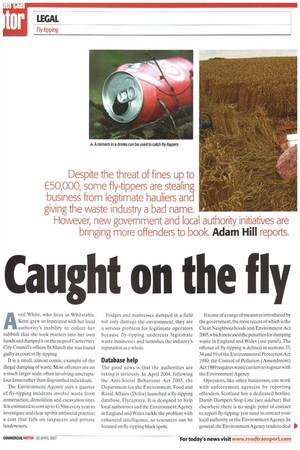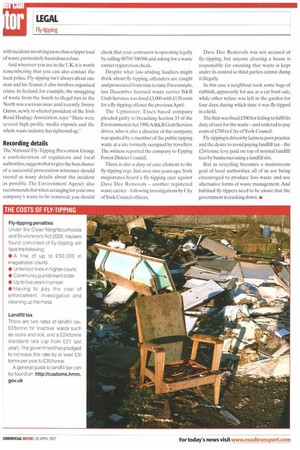Caught on the fly
Page 36

Page 38

If you've noticed an error in this article please click here to report it so we can fix it.
Avril White, who lives in Whitstable, Kent, grew so frustrated with her local authority's inability to collect her rubbish that she took matters into her own hands and dumped it on the steps of Canterbury City Council's offices. In March she was found guilty in court of fly-tipping.
It is a small, almost comic, example of the illegal dumping of waste. Most offences are on a much larger scale, often involving unscrupulous firms rather than disgruntled individuals.
The Environment Agency says a quarter of fly-tipping incidents involve waste from construction, demolition and excavation sites. It is estimated to cost up to £150m every year to investigate and clear up this antisocial practice: a cost that falls on taxpayers and private landowners. Fridges and mattresses dumped in a field not only damage the environment, they are a serious problem for legitimate operators because fly-tipping undercuts legitimate waste businesses and tarnishes the industry's reputation as a whole.
Database help The good news is that the authorities are taking it seriously. In April 2004, following the Anti-Social Behaviour Act 2003, the Department for the Environment, Food and Rural Affairs (Defra) launched a fly-tipping database, Flycapture. It is designed to help local authorities and the Environment Agency in England and Wales tackle the problem with enhanced intelligence, so resources can be focused on fly-tipping black spots. It is one of a range of measures introduced by the government, the most recent of which is the Clean Neighbourhoods and Environment Act 2005, which increased the penalties for dumping waste in England and Wales (see panel). The offence of fly-tipping is defined in sections 33, 34 and 59 of the Environmental Protection Act 1990 the Control of Pollution (Amendment) Act 1989 requires waste carriers to register with the Environment Agency.
Operators, like other businesses, can work with enforcement agencies by reporting offenders. Scotland has a dedicated hotline, Dumb Dumpers Stop Line (see sidebar). But elsewhere there is no single point of contact to report fly-tipping: you need to contact your local authority or the Environment Agency. In general, the Environment Agency tends to deal with incidents involving more than a tipper load of waste. particularly hazardous refuse.
And wherever you are in the UK, it is worth remembering that you can also contact the local police. Fly-tipping isn't always about one man and his Transit; it also involves organised crime. In Ireland. for example, the smuggling of waste from the South to illegal tips in the North was a serious issue until recently. Jimmy Quinn, newly re-elected president of the Irish Road Haulage Association, says: "There were several high-profile media exposes and the whole waste industry has Lightened up."
Recording details
The National Fly-Tipping Prevention Group, a confederation of regulators and local authorities, suggests that to give the best chance of a successful prosecution witnesses should record as many details about the incident as possible. The Environment Agency also recommends that when arranging for your own company's waste to be removed, you should check that your contractor is operating legally by calling 08708 506506 and asking for a waste carrier registration check.
Despite what law-abiding hauliers might think about fly-tipping, offenders are caught and prosecuted from time to time. For example, last December licensed waste carrier B&B Grab Services was fined .£3,000 with £120 costs for a fly-tipping offence the previous April.
The Upminster, Essex-based company pleaded guilty to breaching Section 33 of the Environmental Act 1990.A B&B Grab Services driver, who is also a director of the company, was spotted by a member of the public tipping waste at a site formerly occupied by travellers. The witness reported the company to Epping Forest District Council.
There is also a duty-of-care element to the fly-tipping regs. Just over two years ago, York magistrates heard a fly-tipping case against Dave Dec Removals — another registered waste carrier — following investigations by City of York Council officers. Dave Dee Removals was not accused of fly-tipping, but anyone clearing a house is responsible for ensuring that waste is kept under its control so third parties cannot dump it illegally.
In this case a neighbour took some bags of rubbish, apparently for use at a car boot sale, while other refuse was left in the garden for four days, during which time it was fly-tipped in a field.
The firm was fined £500 for failing to fulfil its duty of care for the waste — and ordered to pay costs of £700 to City of York Council.
Fly-tipping is driven by laziness, poor practice and the desire to avoid paying landfill tax— the i24/tonne levy paid on top of normal landfill fees by businesses using a landfill site.
But as recycling becomes a mainstream goal of local authorities, all of us are being encouraged to produce less waste and use alternative forms of waste management. And habitual fly-tippers need to be aware that the government is cracking down. •






















































































































































































